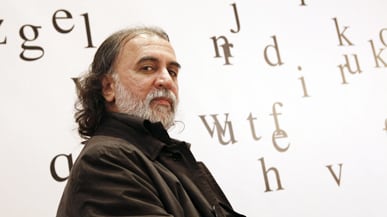Like America at the turn of the century, a thrusting India today is a gold mine for a muckraking journalist. The raw ambition and huge sums of capital unleashed by the country’s boom have fed an equally stunning degree of corruption; scams are counted in the billions now rather than millions.
Tarun Tejpal, 47, is India’s foremost chronicler of this scramble for loot. His newsmagazine Tehelka, both now and in its previous incarnation as a website, has broken nearly all the major political and economic scandals of the past rambunctious decade. “To the sliver of people at the top who have cornered almost all the resources of India, this all looks wonderful because you’re probably raking it in four times as fast,” he says. “But if you travel to the northeast, Kashmir, the south of India, you’ve got a Maoist rebellion, language wars, class wars, caste wars—all going on around us.”
Tejpal is intense yet welcoming, with a shock of long hair and a bright silver beard. We spoke at this week’s Jaipur Literature Festival, and while the two-time novelist has long been a supporter of the event, you also get the sense that he enjoys puncturing the complacency of its well-heeled crowd. His voice rises heatedly as he describes a conversation at dinner the previous night, where some sleek Delhi socialites were complaining about the degree of corruption in the country. “I wanted to say, ‘It’s you!’” Tejpal exclaims. “‘You’re the problem. The country’s not corrupt because the poor are corrupt, for Chrissakes!’
“The interesting thing about the economic boom is that a lot has been driven by just two areas—real estate and mining. There’s vast amounts of corruption associated with both because these involve government signoffs. This is where government and the rich go into cahoots to corner resources.
“Today it’s reached a scale and an acceptability that’s unprecedented, but if I try and dig a little deeper I feel like corruption isn’t even the problem. The problem is the scale of inequality. If you have the level of inequality you have in India, corruption is inevitable. Whoever can make whatever he can however he can will do so. There is no adhering to a larger framework because there is no belief in the justice of that framework.”
“I get a sense of a kind of weakness about Obama,” Tejpal says. “I’m sorry to say that because he’s very eloquent and highly intelligent, probably one of most intelligent presidents you’ve had in your history."

In person Tejpal hardly comes across as a scold, perhaps because he’s close enough to the story to sense its changing currents. “The zeitgeist is shifting,” he says, noting that “a hundred times in the last 10 years” Tehelka was on the verge of folding, but has recently became a magnet for outside investors. “First there was the slightly obscene euphoria of opening markets and international brands and money and fancy cars and perfumes. And then you go beyond the giddiness and step back and try and look at things and see, do they all add up, does it all work? And so suddenly the audience for our kind of work seems to be growing by the day.”
As with so many other facets of the new India, the people are outpacing their representatives. Prime Minister Manmohan Singh, universally acknowledged as one of the most upright leaders in India’s history, recently had to reshuffle his cabinet to address a slew of major corruption scandals, and remains under siege. “The problem is leadership—he’s not a leader,” says Tejpal. “He’s a manager. Leaders have a voice, and managers have a manner—India needs both.” He has much warmer words for Congress Party leader Sonia Gandhi, who has transformed herself from a patent outsider (the Italian wife of former Prime Minister Rajiv Gandhi) into perhaps the most skilled politician in the world’s largest democracy. “I think it’s extraordinary how she’s right-sized a lot of the skew [toward the rich] that was happening in this country,” says Tejpal. “I’m not one to scoff at politics. India needs its politics. Change will come through politics.”
Americans could be forgiven for questioning that last statement. “I get a sense of a kind of weakness about Obama,” Tejpal says. “I’m sorry to say that because he’s very eloquent and highly intelligent, probably one of most intelligent presidents you’ve had in your history. But he’s never risked anything. He’s had a sweet sail from privilege to privilege in some sense. When I look at great leaders almost every one of them before the age of 40 has risked something. For me that’s the litmus test: How will you be when the chips are down? Will you take the hard course?”
He has more sympathy for Obama’s difficulties in South Asia. “Afghanistan in a weird way is embroiled within itself—there’s a kind of internal warring that will cancel itself out. But Pakistan is a monstrous challenge.” The assassination of liberal Punjab governor Salman Taseer laid bare the degree to which Islamization has spread among the Pakistani grassroots. “When the country became independent a lot of the Pakistani elite were very cosmopolitan,” he notes. “But these guys are ideologically driven now. Even if the government and the army can keep their hands on the lever of state power, there’s a kind of energy down below that’s highly malevolent.”
Tejpal isn’t entirely a pessimist about the region, he claims, only cautious. “I think a lot of this story really hinges on a kind of quality of enlightenment that the elites and the privileged need to demonstrate,” he says. “And I just hope we see more of it.”
Plus: Check out Book Beast for more news on hot titles and authors and excerpts from the latest books.
Nisid Hajari is Managing Editor of Newsweek. He is writing a history of the Partition of India and Pakistan, to be published by Houghton Mifflin Harcourt.






